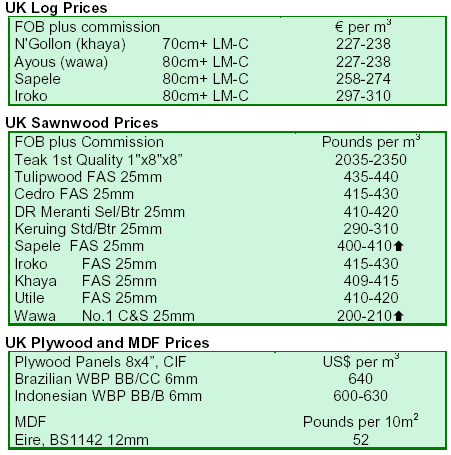|
Report
from the UK
BoE raises interest rates for the fourth time
The Bank of England raised interest rates for the fourth time in twelve months, driving up rates from
5.5% to 5.75%. Economists believe that it would take at least twelve months for the full effect of the rate hike to be
realized. As a result, the market has been not been impacted by the rate hike, although it is expected that in the long term, a market slow down could be more drastic than anticipated.
The pound also reached a 26-year high against the US dollar (1GBP=2.03USD), with investors taking advantage
of increasing interest rates in the UK. Profits of UK companies outside the financial sector are at close to
record levels, according to the Office of National Standards. Investments within the UK also rose by 17% in
financial year 2006-2007.
Firm housing prices lift annual growth rate to 11.1%
Housing prices í░bounced backí▒ in June with prices rising by 1.1%, according to the Nationwide Building Society.
The stronger than expected increase lifted the annual growth rate to 11.1%. Nationwide said
that prices were rising twice as fast as last year; however, it thought that
the rate of growth would slow down in the second half of the year.
The prime minister stated that he wanted three million houses built in the next 13 years, but
acknowledged it required the release of more government owned land and a strong planning system. Many had their doubts that the
latter two issues would be resolved in the short term.
Tight plywood situation prompts search for alternative sources
As reported by EUWID, the British supply of plywood had deteriorated due to cuts in production and
transportation problems. Supplies of birch plywood were particularly low, which resulted in the inability of suppliers to meet
demand in the British market. There were also delayed shipments of amescla
plywood from Brazil in March, April and early May. Although these problems had been
overcome, the supply of Brazilian plywood was still scarce, as recent shipments were used to fill orders sold in
advance. The trend of delayed shipments from Brazil was also expected to continue.
While hardwood plywood supplies from China were still sufficient, British importers were looking for
alternative sources of plywood. In particular, British importers had been looking to South Africa,
Paraguay and Argentina to counteract the dwindling supply of plywood in the UK
market. Demand from consumers had not increased significantly in the first three months of the second
quarter, but importers were reporting an upturn in business over the last few weeks.
Expected duties on Chinese plywood cause shipping paralysis
As the hardwood plywood market awaits a decision on anti-dumping duties on Chinese plywood, further
shipments to the UK are being stopped, reported TTJ. In the sawn hardwood sector, the quiet market
has dampened the effect of shortages in inventories. Prices are rising, but
some sellers looking for turnover are selling at bargain rates.
Lathamí»s profits grow on added value products
TTJ reported that James Latham had increased their profits for 2006, mainly due to its added value
products. Total operating profit was up 46% to about GBP5 million. This surge happened in the face of a shortage of raw materials
and price increases. Chairman Peter Latham noted that decorative products such as melamine and veneer-faced
boards contributed to the success.

EUROPE
MARKET
European buyers scale back purchasing frp, Indonesia
EUWID reported that European buyers were reducing the amount of plywood purchased from Indonesia. The trend
was caused mainly by Indonesian producers demanding higher prices for timber, which
Europeans were unwilling to accept. Yet, this should not be seen as a larger price
trend, as importers and agents had different opinions on price developments for plywood from Indonesia. Some
plywood suppliers had made minor price concessions in the sale of plywood. Due to these concessions,
importers had turned to Indonesia for the purchasing of plywood and reduced their orders for 4mm
plywood in China. Still, others disagreed that the concessions would be valid in the
near term and suggested that higher prices for Indonesian plywood manufacturers would be a continuing reality.
Supply struggles to meet firm demand for okoume plywood in Europe
EUWID noted that bottlenecks occurring for supplies of okoume plywood have not been relieved in most cases.
Although demand for okoume has been high, supplies have not been able to meet European
demand. Supply problems are expected to continue, especially for thin and higher-quality grades. This has particularly impacted
markets using higher quality grades, such as Italy and the Netherlands.
Okoume plywood prices have also risen by about 10% in the second quarter. Prices for thinner grades may rise
faster than thicker grades, and some grades may even rise by 25%. Generally speaking,
however, price increases are expected to be between 4 and 12%.
Norway bans tropical timber in public buildings
The Rainforest Foundation Norway and Mongabay.com reported that the Norwegian government has banned
tropical timber in public buildings. As outlined in the governmentí»s í░Plan of Action for
Environmental and Social Responsibility in Public Procurementí▒, tropical
wood cannot be í░in materials used in the building processí▒ or í░in the building itselfí▒. The Norwegian government
believes no certification scheme at present can guarantee imported wood has been legally and sustainably logged,
and has instituted the ban in an effort to curb trade in unsustainable or illegal forest products.
íí
|